Search the Special Collections and Archives Portal
Search Results
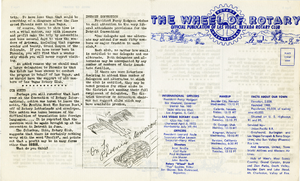
The Wheel of Rotary Las Vegas Rotary Club newsletter, April 20, 1950
Date
Archival Collection
Description
Text
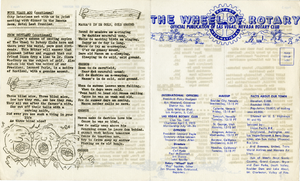
The Wheel of Rotary Las Vegas Rotary Club newsletter, October 6, 1949
Date
Archival Collection
Description
Text
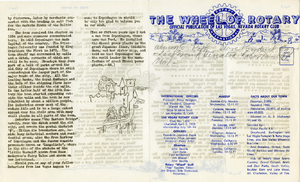
The Wheel of Rotary Las Vegas Rotary Club newsletter, March 16, 1950
Date
Archival Collection
Description
Text
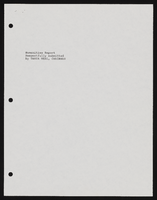
Alpha Kappa Alpha Sorority, Theta Theta Omega Chapter arts and humanities committee report
Date
Archival Collection
Description
From the Alpha Kappa Alpha Sorority, Incorporated, Theta Theta Omega Chapter Records (MS-01014) -- Chapter records file.
Text
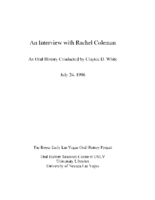
Transcript of interview with Rachel Coleman by Claytee D. White, July 24, 1996
Date
Archival Collection
Description
Interview with Rachel Coleman conducted by Claytee D. White on July 24, 1996. Born in Fayette, Mississippi, Coleman moved to Las Vegas in the 1950s and began washing dishes at the Tropicana. In 1969, having worked for a number of hotels, she was promoted to executive housekeeper at The Hacienda. She ran for president of the Culinary Workers Union Local 226 in 1987. Coleman recalls Las Vegas race and labor relations through the decades.
Text

Transcript of Interview with Barbara Kirkland
Date
Archival Collection
Description
On a sunny day in 1946, the train from Shreveport, Louisiana, stopped at The Plaza hotel in downtown Las Vegas like it always did. But on this particular day, Atha Toliver and her only child, twelve-year-old Barbara, stepped off the train and onto the dusty Western street of Fremont. Narrator Barbara Bates Kirkland recalls that event and living in Las Vegas for most of the next seven decades during this 2004 interview. Like many others who migrated from the South, Barbara Kirkland’s mother would find employment as a maid. A friend who already lived in Las Vegas had told her of the good paying jobs as private maid. So Atha who was determined that her daughter would get an education and a finer future saw this as her opportunity to achieve this for her daughter. Later, the entrepreneurial and creative mother opened Eva’s Flower Basket, a floral shop that Barbara operates in her retirement from teaching. Barbara returned to Louisiana for her senior year in high school, attended Southern University in Baton Rouge, and then returned to Las Vegas to teach first grade at Westside School. Barbara was active in the community, was a founding member of Les Femmes Douze, involved with Zion United Methodist Church and was friends with many of the early African American community leaders at the time. She talks about these, describes various neighborhoods where she lived and about raising her own two children in Las Vegas. Barbara was a founding member of Les Femmes Douze. AKA/Akateens.
Text
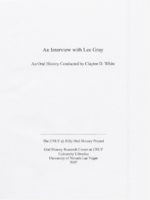
Transcript of interview with Lee Gray by Claytee D. White, November 20, 2006
Date
Archival Collection
Description
Interview with Lee Gray conducted by Claytee D. White on November 20, 2006. Gray came to Las Vegas as a child in the 1950s and attended school at Westside Elementary, K. O. Knudsen Jr. High, and Rancho High School. Following high school, Gray worked for Bob Williams during the summer, helping with Bob's comedy act. After two years of college at Central Arizona College in Glendale, Gray transferred to Regis College in Denver, Colorado, where he worked as a teacher's aide for a school district before returning to Las Vegas to work at University of Nevada, Las Vegas. Beginning in grounds keeping, Gray rose to become supervisor of UNLV's HV/AC Department.
Text

Transcript of interview with Rev. Marion D. Bennett, Sr. by Claytee D. White, January 12, 2004
Date
Archival Collection
Description
Interview with Rev. Marion D. Bennett, Sr. conducted by Claytee D. White on January 12, 2004. Bennett grew up in Greenville, South Carolina and graduated from Morris Brown College before earning his Master of Divinity from the Interdenominational Theological Center in Atlanta. He moved to Las Vegas in 1960 to pastor Zion United Methodist Church, ultimately growing his congregation to over six hundred members. Bennett speaks candidly about the racial tension that the Las Vegas community endured during integration and his fight to establish the Equal Rights Commission in Nevada. In 1973, he ran for the Nevada State Assembly and served for ten years, focusing on quality education and employment along with healthcare and equal rights.
Text
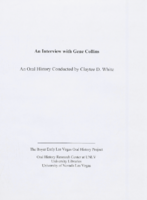
Transcript of interview with Gene Collins by Claytee D. White, August 31, 2000
Date
Archival Collection
Description
Interview with Gene Collins conducted by Claytee D. White on August 31, 2000. Collins grew up in Lake Providence, Louisiana, and moved to Las Vegas in 1966. While attending college, he worked at the Nevada Test Site and trained to be an electrician. He worked with John Patawski and later joined the Aaron Williams Youth Organization and founded a community baseball organization. As a state assemblyman, Collins was instrumental in getting the Martin Luther King Holiday Bill passed along with establishing the Sarah Allen Credit Union. Because of his involvement with the Ministerial Alliance, he was asked to run for president of the NAACP. Under his presidency, he addressed the lack of African Americans in the gaming industry in addition to filing the largest EEOC discrimination suit filed in the state of Nevada against The Mirage Hotel and Casino.
Text

